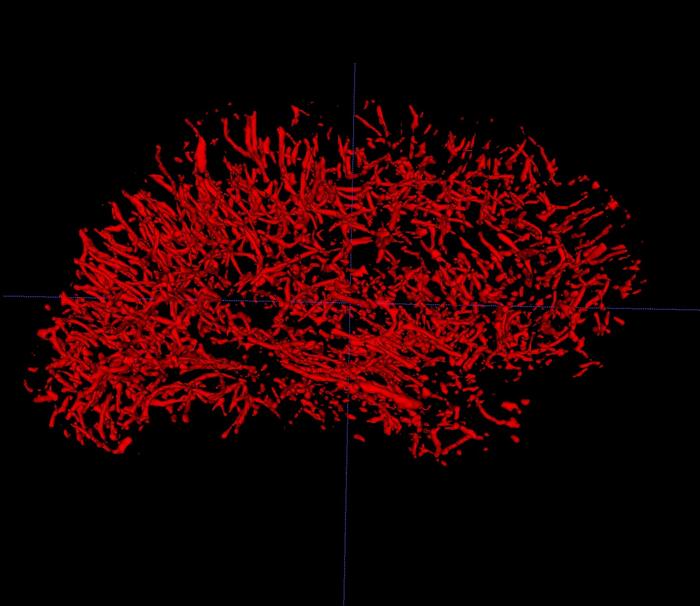Asian Americans are among the fastest growing populations in the U.S. but are significantly underrepresented in Alzheimer’s disease and related dementias (ADRD) research. This means there is a significant knowledge gap of ADRD in this particular group at a time when the global Asian population is rapidly aging and the burden of ADRD will likely mirror this growth. Thanks to a new award, the Keck School of Medicine of USC’s Mark and Mary Stevens Neuroimaging and Informatics Institute (Stevens INI) is perfectly poised to help bridge the gap.

Credit: USC Stevens INI
Asian Americans are among the fastest growing populations in the U.S. but are significantly underrepresented in Alzheimer’s disease and related dementias (ADRD) research. This means there is a significant knowledge gap of ADRD in this particular group at a time when the global Asian population is rapidly aging and the burden of ADRD will likely mirror this growth. Thanks to a new award, the Keck School of Medicine of USC’s Mark and Mary Stevens Neuroimaging and Informatics Institute (Stevens INI) is perfectly poised to help bridge the gap.
Professor of Neurology and Radiology and Director of Imaging Technology Innovation at the Stevens INI, Danny JJ Wang, PhD, has received a new award from the National Institute on Aging (NIA) to examine vascular contributions to cognitive impairment and dementia (VCID) in Asian Americans. Dr. Wang is joined by fellow Stevens INI member Yonggang Shi, PhD, associate professor of neurology, and Xuejuan Jiang, PhD, associate professor of research ophthalmology.
“To the best of our knowledge, this is the first National Institutes of Health funded neuroimaging-specific study on ADRD in the Asian American population. We are grateful to the NIH for their investment in our work and we look forward to groundbreaking findings in this underrepresented population,” notes Dr. Wang.
Vascular contributions to cognitive impairment and dementia are increasingly recognized as a cause of dementia, with cerebral small vessel disease (CSVD) being the most common. CSVD is a term for a number of conditions resulting from damage to small blood vessels in the brain. In most cases, CSVD is caused by the narrowing or blockage of small blood vessels in the brain due to inflammation and/or an accumulation of misfolded proteins called plaques. This can damage other nearby brain cells.
CSVD is also a major contributor to mixed dementia, and the cause of nearly one fifth of all strokes worldwide—and yet, the underlying mechanisms of CSVD remain poorly understood. This lack of knowledge exists in part because cerebral small vessels have been inaccessible to existing imaging technologies for living organisms. Essentially, we have been limited by what we literally cannot see, which is where innovative techniques and clinical translations of advanced imaging from Dr. Wang and his team come in.
“Over the past few years, our group has spearheaded the development of a new high-resolution MRI technique for the visualization, segmentation, and quantification of cerebral small vessels in living organisms. We further developed a comprehensive 3D analysis pipeline for quantifying the structure and density of cerebral small vessels with sizes on the order of a few hundred microns,” says Dr. Shi.
“Our preliminary data showed expected changes in small vessel structure and density, as well as microvascular blood flow with aging, vascular risks, and mild cognitive impairment. This supports the use of our proposed metrics as imaging markers of CSVD and VCID, which we hope will eventually lead to better treatment and intervention of small vessel related VCID,” adds Dr. Wang.
This project is expected to result in a powerful suite of imaging tools for comprehensive characterization of the structure and function of cerebral small vessels, as well as to make meaningful contributions to ADRD research for Asian Americans and other ethnic populations.
“I’m thrilled that Dr. Wang’s new study will expand our suite of projects addressing health disparities in ADRD research,” says Stevens INI Director Arthur W. Toga, PhD. “CSVD is the most common, chronic and progressive vascular disease experienced by millions of people worldwide. We hope this study will provide key insights to advance CSVD research and we are eager to make significant contributions to these areas where knowledge is lacking with our expertise in advanced imaging and computational power.”
The Stevens INI is a powerhouse of ADRD data and applies innovative imaging and information technology to a host of health disparities research. They emphasize health disparities research with projects like the Health and Aging Brain Study – Health Disparities (HABS-HD), the most comprehensive study of Alzheimer’s disease among diverse communities ever conducted.
The Stevens INI is also incorporating health disparities research into existing projects. Their Alzheimer’s Disease Neuroimaging Initiative (ADNI) is the longest longitudinal study in Alzheimer’s disease (AD). ADNI is a multicenter study designed to develop clinical, imaging, genetic, and biochemical biomarkers for the early detection and tracking of AD. ADNI is now embarking on a new chapter by enhancing recruitment of underrepresented populations and adding a diversity core to ensure health disparities research is included in the program.
About Keck School of Medicine of USC
Founded in 1885, the Keck School of Medicine of USC is one of the nation’s leading medical institutions, known for innovative patient care, scientific discovery, education and community service. Medical and graduate students work closely with world-renowned faculty and receive hands-on training in one of the nation’s most diverse communities. They participate in cutting-edge research as they develop into tomorrow’s health leaders. The Keck School faculty are key participants in training of 1200 resident physicians across 70 specialty and subspecialty programs, thus playing a major role in the education of physicians practicing in Southern California.




